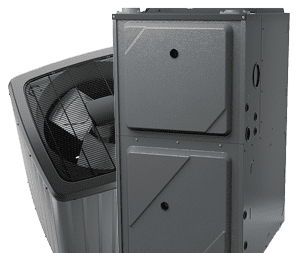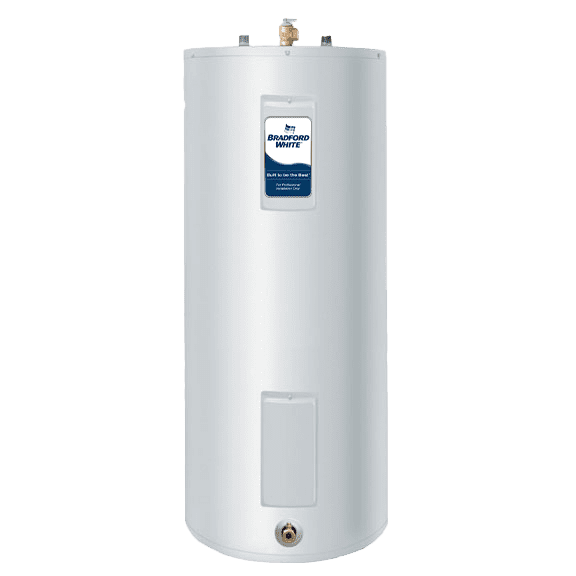Tankless vs. Traditional Water Heaters

Tankless vs. Traditional Water Heaters
Determining the Right Water Heater for Your Family
A new water heater can be a costly investment, so you want to make sure you pick the right style of water heater to best suit your family’s needs. When it comes time to replace your old water heater, or outfit a new home, you need to consider a variety of factors, including how much hot water you use, how efficient different styles of water heaters are, how much each model costs, and how long each style typically lasts.
What is a Tankless Water Heater?
Tankless water heaters, also called on-demand water heaters, rely on high-power burners to rapidly heat water as it flows through a heat exchanger and delivers hot water directly to your shower or taps without storing it in a tank first.
How is a Traditional Water Heater Different?
Traditional water heaters, also called storage tank water heaters, are more common than their tankless counterparts. These water heaters are fitted with insulated tanks, which heat and store water until it is required. This tank is fitted with a pipe, which delivers hot water to your kitchen, bathroom, and any other taps in your home.
Traditional water heaters generally rely on natural gas or electricity. Electric water heaters are typically less expensive, but usually cost more to run (based on current natural gas prices).

Tankless Water Heater Energy Efficiency
According to the US Department of Energy, gas or electric tankless water heaters that create less than 41 gallons (155 litres) of hot water each day are, on average, 24% to 34%% more energy-efficient than gas-powered traditional water heaters. Even families that use more hot water (around 86 gallons or 325 litres per day) and have tankless water heaters still typically require between 8% and 14% less fuel than families that use the same amount of hot water but rely on a traditional water heater. If you install a tankless water heater at each hot water outlet, your energy efficiency will climb to, on average, 27% to 50%.
Tankless water heaters are great for families that use a lot of hot water and typically require that water periodically throughout the day (as opposed to families whose hot water usage is more likely to cluster around peak times, such as just before work.
Tankless water heaters are usually more expensive than traditional water heaters, but they also typically have a longer lifespan. Most tankless heaters have an average lifespan of about 20 years, while most traditional heaters only last between 10 and 15 years.
Advantages & Disadvantages of Tankless Water Heaters
Both traditional and tankless water heaters have their benefits and drawbacks. At the end of the day, you simply need to choose the product that best meets your family’s needs.
Advantages
Tankless water heaters have many benefits. Tankless water heaters:
- Save you more money over time by requiring less fuel.
- Have a longer average lifespan than their tank-based counterparts.
- Are significantly smaller because they don’t require a tank. This makes them ideal for small spaces. Tankless water heaters can even be installed on the outside of your house if you’re home is very small.
- Provide hot water whenever you need it (meaning no more cold showers).
- Provide you with hot water instantly, so you no longer need to run the tap while you wait for hot water. This reduces your water usage, which is good for your wallet and the environment.
Disadvantages
Tankless water heaters also have drawbacks. Tankless water heaters:
- Cost more upfront than traditional water heaters.
- Are generally more expensive to install, particularly if you are switching from a traditional water heater to a tankless water heater.
- Provide hot water on demand, but because they don’t have storage tanks, they can’t provide the same volume of hot water as traditional water heaters. This means that if too many people require hot water at the same time, it can strain the system, resulting in colder water for everyone.
Advantages & Disadvantages of Traditional Water Heaters
Advantages
Traditional water heaters have some advantages over their tankless counterparts. These include:
- A lower initial cost.
- Lower installation costs on average.
- Being simpler than their tankless counterparts, which can translate into less maintenance and repair work. When they do require maintenance or repair, these repairs are also generally less expensive than those required by tankless systems.
Disadvantages
Traditional water heaters also have drawbacks. Traditional water heaters:
- Result in higher utility bills on average. This occurs because you need to purchase enough fuel to not only heat a large quantity of water but also keep it warm.
- Are larger and take up more space than tankless water heaters. This can be a drawback in smaller homes or condos. They also can’t be installed outside the home.
- Take a while to replenish their supply of hot water once it runs out, whereas tankless water heaters provide hot water on demand.
- Have a shorter lifespan on average than their tankless counterparts.
Tankless Water Heater Rebates

To help offset both the initial expense of installing a tankless water heater and the cost of fuel to run it, both the Government of Canada and Ontario’s provincial government offer rebates to eligible individuals and families.
Federal Government Rebates
The federal government offers a rebate of up to $1000 that can be put towards any ENERGY STAR certified tankless condensing water heater. This rebate is applied by the retailer at the point of purchase. Peel Heating and Air Conditioning is an ENERGY STAR retail partner and only sells energy-efficient water heaters.
Government of Ontario Rebates
The Government of Ontario also offers rebates to help Ontarians reduce their energy usage and carbon footprint through its Green Investment Fund. This audit and retrofit program, administered through Enbridge Gas Distribution and Union Gas, helps homeowners identify energy-saving opportunities in their homes and then complete the necessary retrofits (which can include upgrading to a tankless water heater).
Homeowners who heat their water using electricity can participate in saveONenergy programs, which are administered by local electricity distribution companies. These programs help eligible families reduce their energy usage and lower their energy bills.

